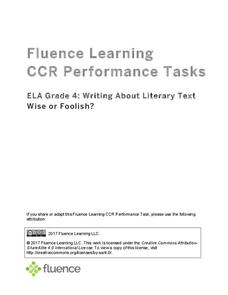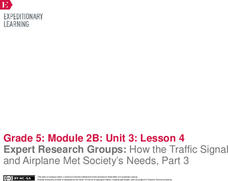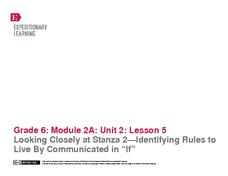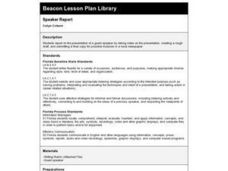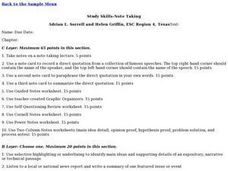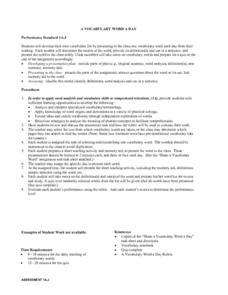Fluence Learning
Writing About Literary Text: Wise or Foolish?
A three-part assessment promotes reading comprehension skills. Class members read literary texts and take notes to discuss their findings, answer comprehension questions, write summaries, and complete charts.
Hyperion Publishing
Words We Live By: Your Annotated Guide to the Constitution
The language of the Constitution can feel quite ominous to young learners, but there are a variety of strategies you can utilize to help your class grasp the important concepts and ideals in our nation's founding document. This lesson...
EngageNY
Expert Research Groups: How the Traffic Signal and Airplane Met Society’s Needs, Part 3
Pupils work in expert research groups, reading an informational article about an invention and completing a note-catcher worksheet. Afterward, scholars work in triads to answer questions based on the text.
EngageNY
Introducing “If” and Noting Notices and Wonders of the First Stanza
After reading chapter 14 of the story Bud, Not Buddy by Christopher Paul Curtis, scholars take part in a read-aloud of the poem If by Rudyard Kipling and compare it to the reading of Bud, Not Buddy. Learners then go deeper into the poem...
Curated OER
Recording the Deed: Note-Taking on Heroes
Students prepare to write summaries of heroes. In this note-taking lesson, students listen to a guest speaker discuss the attributes of unsung heroes and take Cornell method notes.
Curated OER
Navajo Weaving
Middle schoolers explore the Navajo culture. In this Navajo Indians lesson plan, students gain information about their weaving and dancing. Middle schoolers note the patterns in the weaving. Students create a dance that corresponds with...
Curated OER
"The Wind" by James Reeves
Inntroduce primary learners to essential critical reading strategies with an activity based on James Reeves' poem, "The Wind." Learners listen as the poem is read, first as a riddle, and then re-read with the title visible. The class...
Curated OER
The Adventures of Tom Sawyer: "Chalk Talk Strategy”
Hold a silent discussion about concepts related to The Adventures of Tom Sawyer. After reading chapter seven, learners participate in a whole-class written discussion based on guiding questions written on the board by the teacher.
Curated OER
Feudal Powers in Japan
A traditional textbook chapter focuses on feudal powers in Japan, and includes vocabulary, note-taking tips in the sidebar, main ideas, and follow-up assessment questions. It also incorporates opportunities for art analysis and geography...
Curated OER
Parrot in the Oven: Pre-Reading Strategy: 4 Corners
A four corners pre-reading activity introduces class members to the major themes in Victor Martinez's award winning novel, Parrot in the Oven: Mi Vida.
EngageNY
Looking Closely at Stanza 2—Identifying Rules to Live By Communicated in “If”
Pupils take part in a close reading of the poem, If by Rudyard Kipling, in which they delve deep into its meaning and identify its rules to live by. As the grand discussion progresses, learners then relate the poem's rules with those...
California Education Partners
Bud Not Buddy
A two-day assessment challenges scholars to read an excerpt from the story, Bud Not Buddy by Christopher Paul Curtis then complete a series of exercises in preparation for a writing assignment. Day one includes an independent reading...
Curated OER
Inner Circle/Outer Circle Debate Strategy
Arranged in facing concentric circles, half the class discusses an issue. The other half of the class takes notes which are then used to fuel a class discussion and to prepare editorial opinions on the topic at hand. So much emphasis is...
EngageNY
Looking Closely at Stanza 3—Identifying Rules to Live By Communicated in “If”
Just as Bud, from the novel Bud, Not Buddy by Christopher Paul Curtis, had rules to live by, so does the poem, If by Rudyard Kipling, but how do the two relate? Pupils delve deep into the poem's third stanza, participate in a grand...
EngageNY
Notices, Wonders, and Vocabulary of the Third Stanza of “If”
How does one's experience reading a poem's text differ from listening to its audio version? Delve into the insightful question with the poem, If by Rudyard Kipling, as pupils compare and contrast their experience using a note-taking...
Curated OER
Speaker Report
Fifth through eighth graders think of themselves as newspaper reporters as they listen to a presentation by a guest speaker. As reporters, they take notes during the presentation. Using these notes, they create a rough draft and then a...
College Board
Try This! Calculus Teaching Tips
It's important to spice up your lessons. An online article discusses teaching strategies for AP® Calculus. In-class activities include matching games, placemats, multiple choice questions, scripted discussion, involuntary discussion,...
Curated OER
How to DO Just About Anything
Learners discover how to use a digital camera and how to make a PowerPoint presentation. They practice good listening skills and hear how to make a "Supa Dupa Egg." They take notes and use them to create an effective, step-by-step...
Curated OER
Sticky Note Reading Lesson
Fourth graders read about Indiana's history and use sticky notes to record important information. In this sticky notes lesson, 4th graders record cultural information about the people of Indiana.
Curated OER
Read, Write and Talk
Fourth graders explore electricity by reading a story in their class. In this research technique lesson, 4th graders read a Magic School Bus book together and decide which elements of the story are the most important when asked about...
Curated OER
Study Skills-Note Taking
Students use a note card to record a direct quotation from a collection of famous speeches. The top right-hand corner should contain the name of the speaker, and the top left-hand corner should contain the name of the speech.
Curated OER
Summarizing
Young scholars summarize articles, editorials, and news programs. In this writing skills lesson, students take notes on news stories about one issue from more than one source and then write summaries of the issue using rule-based summary...
Curated OER
A Vocabulary Word a Day
Students research one assigned vocabulary word and prepare a short teaching activity and memory aid to present with the word to the class. They take notes on all the new vocabulary words presented to them by other classmates then they...
K12 Reader
The Scientific Method
Introduce the scientific method with a reading comprehension activity. Have kids read a few paragraphs that describe the process of making a hypothesis, gathering evidence, and taking notes that will support the experiment.


